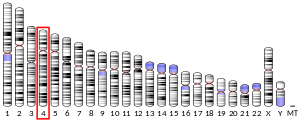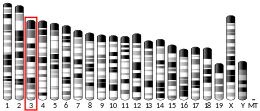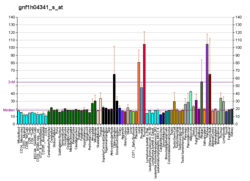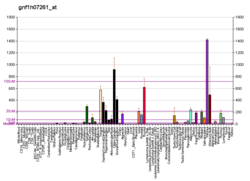SFRP2
Secreted frizzled-related protein 2 is a protein that in humans is encoded by the SFRP2 gene.[5][6]
This gene encodes a member of the SFRP family that contains a cysteine-rich domain homologous to the putative Wnt-binding site of Frizzled proteins. SFRPs act as soluble modulators of Wnt signaling. Methylation of this gene is a potential marker for the presence of colorectal cancer.[6]
References
- 1 2 3 GRCh38: Ensembl release 89: ENSG00000145423 - Ensembl, May 2017
- 1 2 3 GRCm38: Ensembl release 89: ENSMUSG00000027996 - Ensembl, May 2017
- ↑ "Human PubMed Reference:".
- ↑ "Mouse PubMed Reference:".
- ↑ Melkonyan HS, Chang WC, Shapiro JP, Mahadevappa M, Fitzpatrick PA, Kiefer MC, Tomei LD, Umansky SR (Jan 1998). "SARPs: A family of secreted apoptosis-related proteins". Proc Natl Acad Sci U S A. 94 (25): 13636–41. doi:10.1073/pnas.94.25.13636. PMC 28358. PMID 9391078.
- 1 2 "Entrez Gene: SFRP2 secreted frizzled-related protein 2".
Further reading
- Rattner A, Hsieh JC, Smallwood PM, et al. (1997). "A family of secreted proteins contains homology to the cysteine-rich ligand-binding domain of frizzled receptors". Proc. Natl. Acad. Sci. U.S.A. 94 (7): 2859–63. doi:10.1073/pnas.94.7.2859. PMC 20287. PMID 9096311.
- Hu E, Zhu Y, Fredrickson T, et al. (1998). "Tissue restricted expression of two human Frzbs in preadipocytes and pancreas". Biochem. Biophys. Res. Commun. 247 (2): 287–93. doi:10.1006/bbrc.1998.8784. PMID 9642118.
- Lescher B, Haenig B, Kispert A (1999). "sFRP-2 is a target of the Wnt-4 signaling pathway in the developing metanephric kidney". Dev. Dyn. 213 (4): 440–51. doi:10.1002/(SICI)1097-0177(199812)213:4<440::AID-AJA9>3.0.CO;2-6. PMID 9853965.
- Chang JT, Esumi N, Moore K, et al. (1999). "Cloning and characterization of a secreted frizzled-related protein that is expressed by the retinal pigment epithelium". Hum. Mol. Genet. 8 (4): 575–83. doi:10.1093/hmg/8.4.575. PMID 10072424.
- Lee CS, Buttitta LA, May NR, et al. (2000). "SHH-N upregulates Sfrp2 to mediate its competitive interaction with WNT1 and WNT4 in the somitic mesoderm". Development. 127 (1): 109–18. PMID 10654605.
- Strausberg RL, Feingold EA, Grouse LH, et al. (2003). "Generation and initial analysis of more than 15,000 full-length human and mouse cDNA sequences". Proc. Natl. Acad. Sci. U.S.A. 99 (26): 16899–903. doi:10.1073/pnas.242603899. PMC 139241. PMID 12477932.
- Clark HF, Gurney AL, Abaya E, et al. (2003). "The Secreted Protein Discovery Initiative (SPDI), a Large-Scale Effort to Identify Novel Human Secreted and Transmembrane Proteins: A Bioinformatics Assessment". Genome Res. 13 (10): 2265–70. doi:10.1101/gr.1293003. PMC 403697. PMID 12975309.
- Brophy PD, Lang KM, Dressler GR (2004). "The secreted frizzled related protein 2 (SFRP2) gene is a target of the Pax2 transcription factor". J. Biol. Chem. 278 (52): 52401–5. doi:10.1074/jbc.M305614200. PMID 14561758.
- Ota T, Suzuki Y, Nishikawa T, et al. (2004). "Complete sequencing and characterization of 21,243 full-length human cDNAs". Nat. Genet. 36 (1): 40–5. doi:10.1038/ng1285. PMID 14702039.
- Lee JL, Lin CT, Chueh LL, Chang CJ (2004). "Autocrine/paracrine secreted Frizzled-related protein 2 induces cellular resistance to apoptosis: a possible mechanism of mammary tumorigenesis". J. Biol. Chem. 279 (15): 14602–9. doi:10.1074/jbc.M309008200. PMID 14709558.
- Müller HM, Oberwalder M, Fiegl H, et al. (2004). "Methylation changes in faecal DNA: a marker for colorectal cancer screening?". Lancet. 363 (9417): 1283–5. doi:10.1016/S0140-6736(04)16002-9. PMID 15094274.
- Brandenberger R, Wei H, Zhang S, et al. (2005). "Transcriptome characterization elucidates signaling networks that control human ES cell growth and differentiation". Nat. Biotechnol. 22 (6): 707–16. doi:10.1038/nbt971. PMID 15146197.
- Zhang Z, Henzel WJ (2005). "Signal peptide prediction based on analysis of experimentally verified cleavage sites". Protein Sci. 13 (10): 2819–24. doi:10.1110/ps.04682504. PMC 2286551. PMID 15340161.
- Gerhard DS, Wagner L, Feingold EA, et al. (2004). "The Status, Quality, and Expansion of the NIH Full-Length cDNA Project: The Mammalian Gene Collection (MGC)". Genome Res. 14 (10B): 2121–7. doi:10.1101/gr.2596504. PMC 528928. PMID 15489334.
- Otsuki T, Ota T, Nishikawa T, et al. (2007). "Signal sequence and keyword trap in silico for selection of full-length human cDNAs encoding secretion or membrane proteins from oligo-capped cDNA libraries". DNA Res. 12 (2): 117–26. doi:10.1093/dnares/12.2.117. PMID 16303743.
- Clément G, Braunschweig R, Pasquier N, et al. (2006). "Alterations of the Wnt signaling pathway during the neoplastic progression of Barrett's esophagus". Oncogene. 25 (21): 3084–92. doi:10.1038/sj.onc.1209338. PMID 16407829.
- Urakami S, Shiina H, Enokida H, et al. (2006). "Combination analysis of hypermethylated Wnt-antagonist family genes as a novel epigenetic biomarker panel for bladder cancer detection". Clin. Cancer Res. 12 (7 Pt 1): 2109–16. doi:10.1158/1078-0432.CCR-05-2468. PMID 16609023.
- Olsen JV, Blagoev B, Gnad F, et al. (2006). "Global, in vivo, and site-specific phosphorylation dynamics in signaling networks". Cell. 127 (3): 635–48. doi:10.1016/j.cell.2006.09.026. PMID 17081983.
- Huang ZH, Li LH, Yang F, Wang JF (2007). "Detection of aberrant methylation in fecal DNA as a molecular screening tool for colorectal cancer and precancerous lesions". World J. Gastroenterol. 13 (6): 950–4. doi:10.3748/wjg.v13.i6.950. PMID 17352030.
- Veeck J, Noetzel E, Bektas N, Jost E, Hartmann A, Knuchel R, Dahl E (2008). "Promoter hypermethylation of the SFRP2 gene is a high-frequent alteration and tumor-specific epigenetic marker in human breast cancer". Mol Cancer. 7 (83): 83. doi:10.1186/1476-4598-7-83. PMC 2613402. PMID 18990230.
This article is issued from
Wikipedia.
The text is licensed under Creative Commons - Attribution - Sharealike.
Additional terms may apply for the media files.





